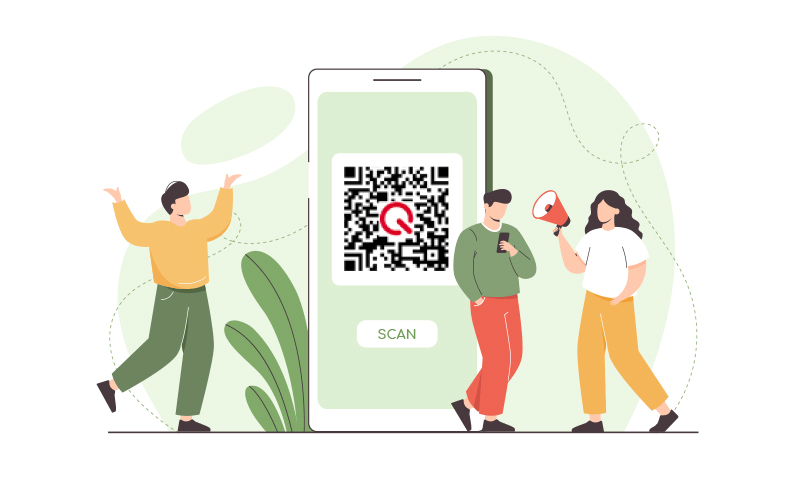
QR Codes for Environmental Sustainability Initiatives
QR codes are transforming how businesses promote sustainability by offering eco-friendly solutions to reduce waste and improve transparency. With their ability to store vast amounts of data in a small, scannable format, QR codes empower industries to cut down on resource usage and embrace greener practices.
Key Benefits of QR Codes for Sustainability
1. Reduce Paper Consumption
- Digital Documents: Replace paper menus, user manuals, and brochures with QR codes linking to digital versions.
- Eco-friendly Campaigns: QR codes eliminate the need for flyers and printed marketing materials, saving trees and reducing waste.
2. Lower Printing and Set-Up Costs
- By directing customers to online content, businesses reduce printing expenses and minimize their environmental impact.
- Example: Thrift+ uses QR codes to eliminate printed labels, further reducing their carbon footprint.
3. Promote Sustainable Marketing Strategies
- QR codes provide an accessible way for customers to engage with a brand's eco-friendly initiatives.
- They enhance brand image by showcasing environmental responsibility and providing direct access to sustainability statements.
Industries Leveraging QR Codes for Sustainability
1. Apparel Brands
- Sustainability Stories: QR codes on tags provide information on material sourcing, ethical practices, and carbon footprints.
- Customer Empowerment: Shoppers can make informed decisions by learning about a garment’s journey from raw materials to finished product.
2. Food & Beverage
- Digital Menus: Restaurants use QR codes for contactless menus, reducing paper usage.
- Recycling Guides: Beverage companies add QR codes to packaging with instructions for proper recycling.
3. Electronics Manufacturers
- E-Waste Recycling: QR codes direct customers to e-waste recycling programs and responsible disposal options.
- Product Instructions: Digital user manuals eliminate bulky paper documents.
4. Transportation
- Digital Tickets: Airlines and public transport systems use QR codes for paperless boarding passes and tickets.
- Sustainability Statements: QR codes educate passengers about efforts to reduce emissions and promote green travel.
QR Codes in Sustainable Fashion
Empowering Ethical Choices
- Material Transparency: QR codes reveal details about fabric origins, labor conditions, and manufacturing methods.
- End-of-Life Options: Brands use QR codes to inform customers about upcycling or recycling programs for old garments.
Creative Uses of QR Codes in Fashion
- Interactive Labels: Direct shoppers to videos showcasing ethical production.
- Eco-Certifications: Highlight certifications like Fair Trade or Organic Cotton through scannable codes.
QR Codes for Packaging
Making Packaging Smarter and Greener
- Eco-Friendly Alternatives: QR codes replace printed labels with digital information, reducing packaging size and waste.
- Consumer Education: Provide recycling tips, sustainability stats, and reuse ideas directly via QR codes.
Examples
- Coca-Cola: Links to their Business & Sustainability Report through QR codes on bottles.
- Beauty Products: QR codes on packaging guide users to refill programs or eco-friendly disposal tips.
Sustainability Through Traceability
Tracking Product Origins
- Transparency: QR codes allow customers to trace a product’s journey from farm to shelf.
- Ethical Sourcing: Highlight supply chain accountability and compliance with sustainability standards.
Examples
- Agriculture: QR codes reveal farming practices and origin of raw materials.
- Retail: Share data on ethical manufacturing and carbon offsets.
How QR Codes Minimize Environmental Impact
- Reduce Paper Waste: By digitizing manuals, tickets, and marketing materials.
- Eliminate Marketing Waste: Create campaigns that drive engagement without relying on physical materials.
- Streamline Reuse Programs: QR codes enable updates without reprinting labels or packaging.
Making Sustainability Accessible
Educating Consumers
- Sustainability Statements: QR codes link to a brand's environmental commitments and progress reports.
- Recycling Gamification: Encourage participation in eco-friendly practices with interactive content accessed via QR codes.
Affordable Tools for Change
- Free online QR code generators make it easy for businesses to adopt this technology and align with green goals.
Conclusion
QR codes are a cornerstone of modern environmental sustainability initiatives. By reducing reliance on paper, promoting transparency, and educating consumers, these codes pave the way for a more eco-conscious future. As businesses continue to integrate QR codes into their strategies, they will not only minimize their environmental impact but also strengthen their commitment to a greener world.